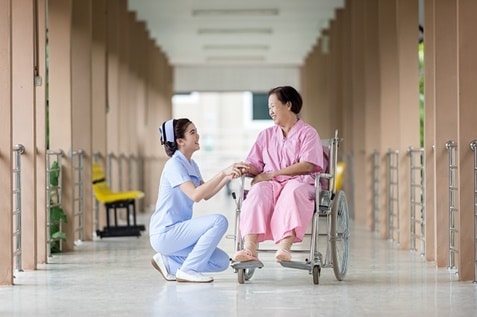Even with all the good that they’re doing for others, healthcare professionals are exposed to a lot of hazards and dangers to their own health and wellbeing.
The most obvious are those that are biomedically related, but there are many other things that can adversely affect them if they’re not careful.
Considering the sensitive and volatile nature of the industry, it’s important that employers take extra care of their health care workers. Here are top 7 tips that are guaranteed to keep your workers safe and in top shape.
1. Be extra careful when lifting
There will be occasions where heavy lifting is required. Some patients need to be helped up or lifted entirely. Heavy equipment should be moved around your healthcare centre. It’s inevitable.
As much as possible, the use of mechanical aids while doing heaving lifting is preferable as they are guaranteed to help distribute the load and strain rather evenly. Examples of these are lifts, pivot disks, and slide boards which make patient transport so much easier.
If these are not available, make sure to master proper lifting techniques for medical staff. There are some specifics in this industry which require special care from your behalf.
2. Working in pairs is better—always
An alternative lifting option that often gets overlooked is working in pairs. It distributes the load between two people. This is the perfect option if the mechanical means are unavailable. However, here are some things that you need to consider with this option.

Photo Courtesy of Pixabay Image by tpsdave
First, work with someone of the similar height and build. This will make it an easy and equitable task for both of you. Second, make sure to coordinate carefully in order to avoid dropping and damaging whatever it is that you are lifting. This is especially true if you’re lifting a patient.
3. Constant maintenance is a must
Whether it’s something as minor as bed cranks and wheelchair casters or something as major as monitors, constant maintenance checks are a must.
A lot depends on the effective functionality of this equipment, you cannot afford to have anything malfunction—especially at critical moments like emergency situations.
If someone is responsible for maintenance, make sure to constantly check the quality of their work. Verifying a job well done is also important and not at all something to shy away from given the seriousness of those affected.
4. Report all hazards immediately
In most other cases and places, spills and leaks aren’t considered a huge danger. Often, all it takes is a simple wipe away to get things all cleaned up. This is not the case in the medical industry. Here, things that leak can be more dangerous than injuries obtained by slipping on wet floor.
This is especially true for the biological matter like blood and other bodily fluids that might potentially contain infectious bacteria/strains.

Photo Courtesy of Pexels Image by Pixabay
However, don’t ignore the simpler hazards. Broken glass strewn all over the floor can potentially be harmful to your patients or even yourself, so report even these things immediately.
5. Prioritise careful needle handling
Used needles are a very credible potential medical hazard. The risk of infection and transference of diseases is far higher with improper needle handling. Make sure that everyone is aware of the proper method for handling needles.
If necessary, schedule a training session in order to get everyone up to speed. Put up posters and reminders about the centre so that people are constantly reminded about safe handling procedures.
Additionally, invest in safe needles, They’re a tad more expensive but they’re guaranteed to provide proper protection for workers at all times.
6. Always utilise protective equipment
From special gloves to masks and scrubs – all these things are absolutely essential to every healthcare worker and should never be left out. These essentials protect you physically from harm and keep away germs from sensitive areas of your body.
By keeping you healthy, this protective gear allows you to function at peak efficiency which is a definite plus for you patients and your career.

Photo Courtesy of Pixabay Image by DarkoStojanovic
To properly distribute protective equipment, you need to be aware of the specific dangers of every department in your medical centre. By working in different conditions, each of your employees has different protective needs.
For instance, those who handle laundry need sturdier gloves because they are at risk from stray needles. Medical experts that work with patients that suffer from highly infectious diseases need high-quality masks. The list goes on.
7. Be aware that physical assault is a possibility
Lastly, there is a very real risk for physical assault from certain patients. While much rarer than other risks, it’s still something to consider.
It is important identify patients with a history of psychiatric disorders that involve violence. If there are any that are probable problem cases, make sure that handlers of such patients are working with a partner.
There are a lot of important things to consider when it comes to occupational health and safety in the healthcare industry and for many years.
Alsco has been Australia’s top service provider for the needs of many companies from different industries and the medical industry is not an exception.
Healthcare is one particular aspect we’ve specialised in. From uniforms to safety mats, first aid stations, and other relevant equipment, Alsco can provide for all that you need.
Give us a call today and we’ll be more than happy to help craft a custom package to meet your company’s specific needs.
Photo Courtesy of Pixabay Image by sasint

